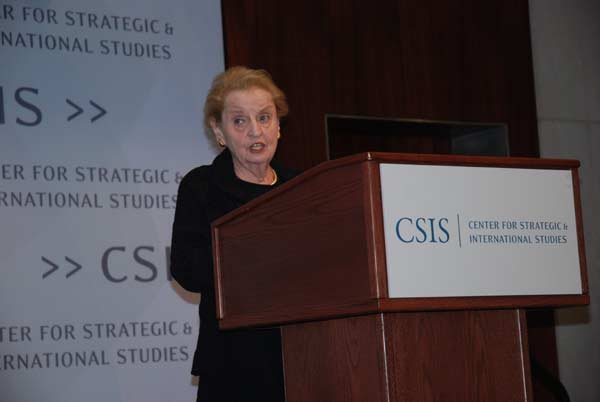US 'miscalculated' on AIIB: Albright
By By DONG LESHUO in Washington and LIA ZHU in San Francisco (China Daily USA) Updated: 2015-04-01 13:43
 |
|
Former Secretary of State Madeleine Albright talked about the US-China relations at the Center for Strategic & International Studies on Tuesday in Washington. Dong Leshuo/China Daily |
"I think maybe the bottom line is we screwed it up," former US Secretary of State Madeleine Albright said Tuesday about the United States' decision to not seek membership in the Asian Infrastructure Investment Bank.
"I think we miscalculated, in terms of that other countries also want to be part of the Chinese initiative," she said. "All of a sudden everybody was in."
Forty-six countries had joined or applied to become founding members of the China-led bank by Tuesday's deadline, including some key US allies such as Great Britain, France, Germany and Italy.
Albright, who runs the Albright Stonebridge Group, spoke at the Center for Strategic and International Studies in Washington. The center also presented the findings of a two-year study of China's economic decision-making, which was geared toward helping inform US strategy.
The study argues that China's economic trajectory in coming years will have a substantial impact on the prospects for US and global growth, as well as on broader American interests in the Asia-Pacific region and the world.
Albright agreed that there have been questions from China and other countries that "the US has been too dominant in the World Bank. There has been a certain amount of frustration about that.
"I would hope we could recapture some kind of cooperation here," Albright said, suggesting that the US should look for ways for the AIIB and the World Bank to cooperate."
In San Francisco, US Treasury Secretary Jack Lew, who returned Tuesday from a trip to China, said in reference to the AIIB that the US "welcomes new additions to the international development architecture".
In an address to about 100 executives of Silicon Valley-based companies and businesses who attended the meeting held by the Asia Society, he said China need to "maintain and advance high standards in institutions" as the two countries "work together to address the challenges of the 21st century".
"I returned today from meetings in Beijing, where I had frank and constructive conversations with Chinese leaders about the state of our two economies and the bilateral issues we face," said Lew, who met Premier Li Keqiang in Beijing on Monday.
Kenneth G. Lieberthal, senior fellow of foreign policy studies at Brookings Institution, said the AIIB "really represents a new model".






